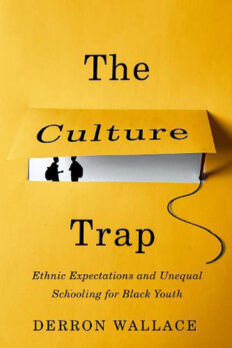Publisher
Oxford University Press
ISBN 10
9780197531471
Published
17 Jan 2023
The complex and nuanced manner in which class, gender and ethnicity tend to shape and reinforce inequalities in educational outcomes is rightly of great interest to educators, policy makers and researchers here and across the world. However, little attention is given to how culture intersects with these factors resulting in unequal schooling experiences and therefore differential outcomes for students of different racial and ethnic backgrounds.
Perhaps that’s because it’s a complicated task and one that requires a deep understanding of the education field, its practices and discourses. Into this gap steps Derron Wallace with his new book, The Culture Trap.
I first came across Wallace on a BBC Thinking Allowed podcast on Pierre Bourdieu in 2016. He was one of the panellists exploring the legacy and ideas of the French sociologist who, as I previously explored in these pages, coined the term ‘cultural capital’. His performance made an impression on me, so I was keen to read his ambitious new book, in which he argues that educators’ obsession with Black Caribbean students’ culture is “an alibi for racism in a putatively post-racial society”.
Drawing on his ethnographic study of second-generation Black Caribbean pupils in schools in London and New York, Wallace carefully, vividly and critically examines the historical factors and structures that account for differences in their educational achievements. Building on his reading of Bourdieu, Wallace theorises the concept of ‘ethnic expectation’, which shows how ethnic perceptions are used as a lever to form a ‘culture trap’.
Since the 1920s, Black Caribbean pupils have been deemed a high-achieving ethnic minority group in New York. Later from 1950s, perceptions of the same ethnic group in Britain’s schools have been the mirror opposite. The perceptions, on both sides of the Atlantic, are borne out by their outcomes. National statistics on Black Caribbean pupils’ achievement in England remain nothing if not concerning.
Wallace’s argument that Caribbean identity has been framed as a liability is compelling
Wallace attributes this racial achievement gap to expectations, but is it evident in everyday school practices that teachers have accepted a dominant narrative that Black Caribbean pupils are less capable compared with other pupils, even those from other minority groups in the UK? His central premise is that teachers’ expectations come to shape their pupils’ eventual outcomes, but this argument is not without problems.
Wallace maintains that “in London, […] Caribbean culture and collective identities are marginalized and stigmatized as ‘ethnic penalties’”. But I can recall teaching many Black Caribbean pupils who achieved well in school, and while some didn’t reach their potential, at least some of their under-achievement could be attributed to sub-cultures that came into conflict with school rather than schools’ low expectations.
But any good sociological text should lead you to question your own individual experience, and Wallace’s argument that Caribbean identity has been framed as a liability in the UK and that school practices such as setting reproduce racial and ethnic inequalities which align “Caribbean culture to failure” is compelling.
When he elucidates on the logics of school and ethnic expectations, his argument that Black Caribbean pupils have “internalised ethnic expectations which are mostly low” accounts for some of the school-resistant sub-cultures I’ve encountered and makes for a persuasive interpretation of the group’s persistently concerning outcomes. Indeed, the scope of this study exemplifies how Black Caribbean parents’ perceptions come to impact on their children, perpetuating the problem across generations.
Further, Wallace argues that “Black Caribbean young people confirm their participation in symbolic violence”, and I would have liked to know more about the interaction of race and social class at this juncture. But this is a practical book too; part 2 is dedicated to strategies Black Caribbean pupils use to negotiate ‘the culture trap’ in order to overcome the intergenerational stereotypes that threaten to hold them back – an enlightening read for any teacher with Black Caribbean pupils.
Overall then, Wallace’s book did enough to alleviate my concern that the idea of a culture trap was too simply and purely deterministic. I found it a fascinating, timely and beautifully written book, and I will be digesting its arguments about the role of culture in reproducing racialised inequality for a long time to come.













Your thoughts